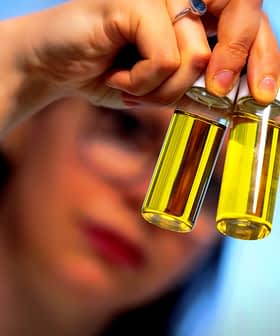Increased Attention on Olive Oil Volatile Compounds
Increased attention is being paid to the study of volatile compounds in virgin olive oil and their interactions with the sensory profile.
The chemical markers, in other words the elements that give us the taste and aroma of olive oil, have been analyzed in different institutional seats and conferences recently: from the EU Commission in Brussels to the chemical and sensory groups of the International Olive Council (IOC) in Madrid, to the Italian society for the study of fatty substances (SISSG), and during meetings like the International Enological and Bottling Equipment Exhibition conference (SIMEI) in Milan.
The results achieved will be used to support the sensory method to evaluate extra virgin olive oil with an instrumental tool. “The goal of the underway research on volatile compounds of olive oil is to identify the molecules which are recognized by our sensory receptors, decoding their presence through chemical parameters,” explained Anna Cane, during the Symposium on volatile compounds of olive oil organized in Rome (26 February) by Assitol, the Italian olive oil industry association, with the support of the IOC and the collaboration of the SISSG.
Above all, from these studies we can obtain valuable information to fight the most insidious frauds.
“It will be finally possible to define innovative scientific instruments, made available to the olive oil sector, that can effectively support the current quality and authenticity control methods of products.”
This was the starting point of the conference where the best European researchers on volatiles compounds gathered, included Carlo Bicchi, professor of Pharmaceutical Biology at the University of Turin; Lanfranco Conte, professor of food chemistry at the University of Udine; Maurizio Servili, professor of food technology at the University of Perugia, Stefania Vichi, from the department of food and nutrition at the University of Barcelona; Ramón Aparicio from the Istituto de la Grasa CSIC in Sevilla; Anna Cane, supervisor of technicians at Assitol and Mercedes Fernández Albaladejo, the head of the IOC Olive Oil Chemistry and Standardization Unit.
The representative of the Central Inspectorate for the protection of quality and fraud prevention of food products (ICQRF) Angelo Faberi, the president of the olive oil group of Assitol Angelo Cremonini and the general manager of Assitol Claudio Ranzani also attended the event that looked at the future of the quality of olive oil.
Volatile compounds of virgin olive oils are the vehicles by which an intangible but complex food communicates a varied series of sensations and emotions to our highly sophisticated perceptual system. The odorous molecules that come into contact with the myriad of olfactory neurons endings (dendrites) placed in the nasal cavity in proximity of the ethmoid, under the cribrose lamina determine an absolute concert of electrical signals which are then decoded both by conscious brain (orbitofrontal cortex) and by the unconscious brain (amygdala), in order to trigger the whole set of emotions and sensations (stimuli) that extra virgin olive oils can give to their admirers. This according to Carlo Bicchi, who referred to the two Nobel Prizes for Medicine, Richard Axel and Linda B. Buck, for their discoveries of the odorant receptors and the genetic organization of olfactory system.
The more you delve into nature and the intimate relationships between these molecules and the human perceptual system, the more you can really know an agri-food product like olive oil, both in order to harmonize legislative systems and improve quality on the basis of the ultimate consumer need.
The road is not easy nor immediate, but possible following the canons of scientific research and supporting young researchers which, at the European level, have accomplished important results in the field of chemosensory quality control of oils from olives, as presented by Stefania Vichi from the University of Barcelona. Following this path, it will be possible to allocate to every principal sensation a set of odorous molecules that interact in various ways, as evidenced by the numerous studies carried out by Ramon Aparicio. This way it will be possible to verify and monitor more efficiently the manufacturing processes of agri-food products in order to satisfy the needs, not only qualitative but also emotional, of the modern consumer.
“We want to combine quality research with the needs of the consumer, using the tools that science makes available,” said Angelo Cremonini of Assitol. “Promoting a real tasting education and knowledge of products, the consumer will finally become an important judge of quality and, above all, from these studies we can obtain valuable information to fight the most insidious frauds.”
Experts and entrepreneurs have reiterated their commitment to a greater collaboration. The common objective of all the ongoing studies is to provide the entire supply chain with innovative instruments capable of verifying the quality and authenticity of the products, stimulating new itineraries of research in order to strengthen methods and parameters of sensory analysis and provide greater guarantees for operators and consumers.








